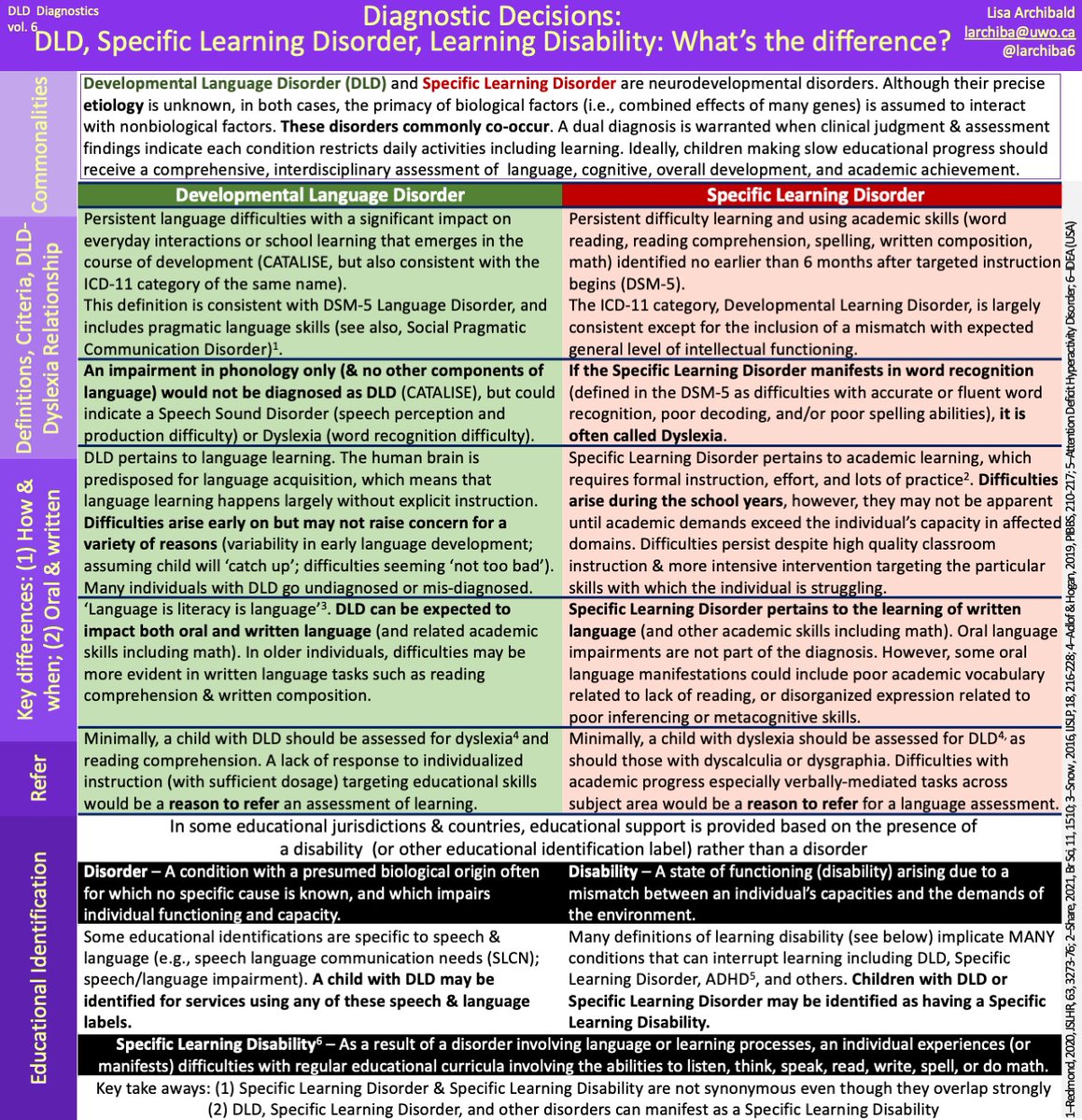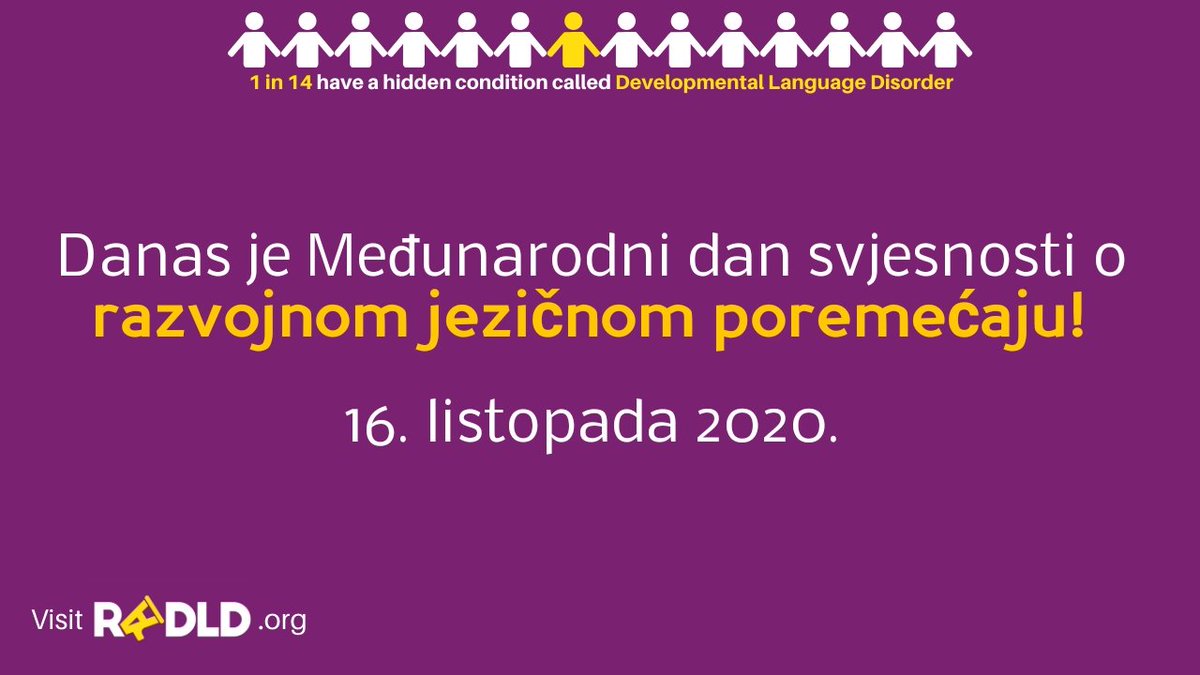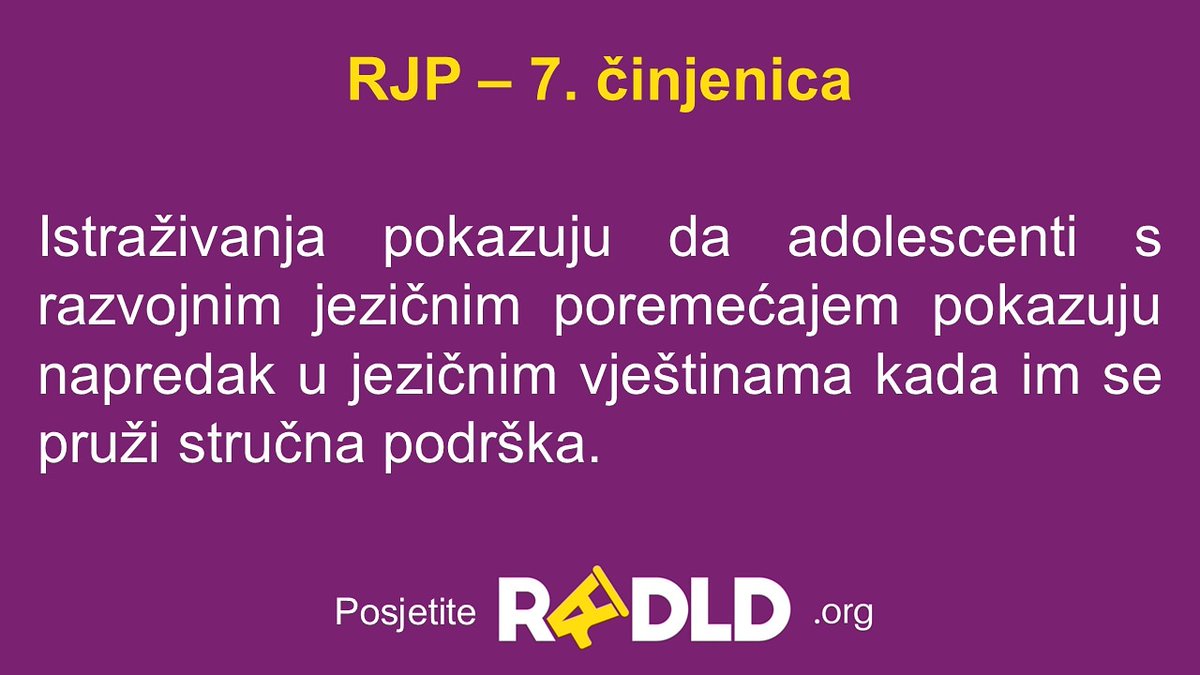Discover and read the best of Twitter Threads about #devlangdis
Most recents (24)
Its Family Day in Canada so I'm sharing volume 6 of the DLD Diagnostics Toolbox with my global #DevLangDis family. It addresses questions related to diagnoses & labels used by SLPs/SaLTs & educational psychologists to describe children with language and/or learning difficulties. 

Please be sure to read the full blog with this volume. It's the longest yet because there's lots to discuss here! uwo.ca/fhs/lwm/news/2… #DLDToolbox
Volume 6 was challenging because the terms are used differently across educational jurisdictions & countries. Be sure to check definitions of (Specific) Learning Disability and the way the terms are used in your system. #DLDToolbox 

Verhoeven & Perfetti provide a fascinating summary of their volume considering universals in learning to read across language & writing systems.
tandfonline.com/doi/full/10.10…
tandfonline.com/doi/full/10.10…
'Writing systems get the complexity they need'
Verhoeven & Perfetti describe the writing accommodations corresponding to various language features (although I'm not sure this table will be legible)
Verhoeven & Perfetti describe the writing accommodations corresponding to various language features (although I'm not sure this table will be legible)

They then describe 9 operating principles: attend to salient stretches of speech, syllables, written signals, know orthographic inventory, increase familiar words, gain fluency, attend to morphological relations, use knowledge of language, executive functions.
Very late in doing my annual reading this year. I am not teaching #WesternDLD2 this Fall (on sabbatical) so other tasks were prioritized this summer. Starting now for 2021...
I'm interested in voice21.org's oracy framework & the emphasis on students learning through talk & to talk.
I'm wondering if children with #DevLangDis in these classrooms do better. It echoes themes @57Justice raised in her @CLTTJournal lecture.
I'm wondering if children with #DevLangDis in these classrooms do better. It echoes themes @57Justice raised in her @CLTTJournal lecture.

This Accepted article on supervisor responses to patient microagressions directed to their medical students is interesting & helpful. Importance of pre-brief, following student preferences, bearing witness & creating educational safety. See fig 1 for guide
journals.lww.com/academicmedici…
journals.lww.com/academicmedici…
Welcome to #ImplementationThursdays!!! I'd like to dedicate this week's thread to parents/caregivers and their important role in any implementation effort. #ImpSci #DevLangDis #Dyslexia #ELAchat #SLPeeps
Lately, I've been reading a lot about parents/caregivers' perspectives of their children's communication disorders and their experiences around them.
For example, De Lopez, @Renagalway, et al. asked parents how they made sense of their children's speech and language disorders and how they described them across 10 countries
pubs.asha.org/doi/10.1044/20…
pubs.asha.org/doi/10.1044/20…
Tonight I watched @bypriscila 's presentation from the #ApraxiaKids conference (Session 200). Co-occurance of Developmental Coordination Disorder(DCD) and Childhood Apraxia of Speech(CAS).
The prevalence of DCD in school aged children is 5-6%, or 1 in 20. It's considered a "hidden condition", because it's underdiagnosed, and people aren't aware of it.
This reminds me of Developmental Language Disorder (DLD) #DevLangDis #ApraxiaKids
This reminds me of Developmental Language Disorder (DLD) #DevLangDis #ApraxiaKids
SLPs may have an important role in referring children with possible DCD, as we're very likely to see them before 5 years of age.
(DCD Dx not recommended for children <5).
Many children require help with their motor skills development before age 5.
#ApraxiaKids
(DCD Dx not recommended for children <5).
Many children require help with their motor skills development before age 5.
#ApraxiaKids
Welcome to #ImplementationThursdays!!! Last week, we discussed a bit about what #ImpSci is and what it can do to improve uptake of #EBP. This week, I want to focus on implementation strategies - things that you do to change something in your context and facilitate implementation.
Usually, when you do #ImpSci work, you begin by examining what in your target context influences implementation and whether it is acting as a barrier or a facilitator. Identifying barriers to implementation is important because these are the things that you want to change.
And the way to change them, eliminate them, is by using implementation strategies: strategies that address barriers and enhance the adoption of a particular program. Here is a nice summary by @ImpSciUW
impsciuw.org/implementation…
impsciuw.org/implementation…
Welcome to #ImplementationThursdays!!! This week, instead of reviewing an article, I decided to introduce implementation science and compile useful resources for anyone who might be interested. Here we go! #ELAchat #ImpSci #DevLangDis #Dyslexia
Let's start with the problem. The problem is that high-quality, evidence-based programs do not always end up in routine practice like schools. For example, a review showed that it takes on average 17 years for only 14% of research to be integrated into practice.
17 YEARS AND ONLY 14%! This means that programs that we know work are not used in routine practice and do not benefit those who need them. This means that our children with #DevLangDis and #Dyslexia for example do not receive high-quality services.
Listening to @57Justice at @CLTTJournal summer lecture. #DevLangDis is the most common reason that children receive special education, especially in the primary school years.
@57Justice @CLTTJournal Justice: our goal in speech therapy should be to optimize language growth for a given period. To do this, we need to have a goal for the growth in language. Benchmarks should be known: pubmed.ncbi.nlm.nih.gov/28124066/
@57Justice @CLTTJournal Justice: We should be doing everything we can to optimize language during the early years. That means, focusing on input. Inclusive classrooms can be an important source of language input for kids with language disorders.
and last, Wendy Lee is following up on Neil's presentation with a focus on children with #SLCN and #DevLangDis. So focus on oracy and teaching children oracy skills. Speaking from a SLT and practice point of view. #NAPLIC21
pathways to invervention to children. Intervention at tier 1 - high quality teaching and interactions for all children. Schools should monitor progress. raising red flags and risk factors for children struggling with oracy education and experiencing difficulties. #NAPLIC21
Collaboration is key. Wendy might raise awareness of what TLD is and what #DevLangDis and #SLCN looks like. So raising awareness. Still have underidentification, so flagging this to teaching staff is key. flagging up students with possible problems.#NAPLIC21
Oh no! I must have misunderstood when we'd be back! I've just put my headphones on now. getting back into it now. #NAPLIC21.
Now listening to Mary-Jo Spearey and Pippa Cotterill now. Discussing joint working in Wales. #NAPLIC21
Different professions speak different language sometimes. Important work to ensure shared understanding. They now have a well established service level agreement between SLT service and ComIT (not sure what that is - sorry). #NAPLIC21
next up is Louise Buckland discussing the Nuffield Early Language Intervention (NELI) that was just discussed by Charles Hulme.Louise works at St John's primary school. Going to tweet in a thread again #NAPLIC21
school had a high number of children with speech and language need. Louise went on a two day training. Was part of Phase 1 of implementing NELI into schools. First cohort is not in year 3 #NAPLIC21
*now in year 3
Today’s #TuesdayArticle is by @drbonniesinger & Dr Anthony Bashir (if he's on Twitter, please let me know!). If I’m honest, I added it to my reading list because I liked the title.
(I also wanted to learn about working memory!)
pubs.asha.org/doi/10.1044/20…
1/10
(I also wanted to learn about working memory!)
pubs.asha.org/doi/10.1044/20…
1/10
Note: it was published in 2018 & uses the old term- SLI (Specific Language Impairment). We now use DLD (Developmental Language Disorder) #devlangdis.
More here about the different terms via @tiffanyphogan dldandme.org/terminology/
2/10
More here about the different terms via @tiffanyphogan dldandme.org/terminology/
2/10
Working Memory is used to hold in mind and mentally manipulate information for short periods of time, for a specific purpose. For children with SLI (or DLD #devlangdis), verbal working memory can be vulnerable.
3/10
3/10
a little thread of stuff that has inspired my thinking this year. 1/
This paper by Abenavoli was actually pub. in 2019, but I didn’t see it til Jan. My view is that improving outcomes for #devlangdis #DLD requires improved early years provision. However, even for the best programmes, positive effects fade out over time.
psycnet.apa.org/record/2019-67…
psycnet.apa.org/record/2019-67…
The paper provides a useful summary of why that might be and what we can do to address this – hint: we can’t just focus on early intervention, but need to know what comes next. 3/
Dragi pratitelji, hvala vam na sudjelovanju na predavanju putem Zoom-a. Žao nam je što se nisu svi uspjeli priključiti. Predavanje smo snimali te će snimke i prezentacije izv. prof. dr. sc. Jelene Kuvač Kraljević i Nike Vukelić uskoro biti dostupne svima. 



Također, hvala vam na dijeljenju naših objava. Danas ste bili posebice aktivni, čime direktno pomažete u podizanju svjesnosti o RJP-u, jer informacije tako činite dostupne velikom broju ljudi.
Vaša nam podrška puno znači i motivira nas da nastavimo graditi ovu kampanju, a sve s ciljem da RJP i osobe koje on pogađa budu što vidljiviji.
HVALA 🙂💜💛
#razvojnijezicniporemecaj #RJP #PSRJP #RJPVidiMe #devlangdis #DLD #RADLD #DLDSeeMe
HVALA 🙂💜💛
#razvojnijezicniporemecaj #RJP #PSRJP #RJPVidiMe #devlangdis #DLD #RADLD #DLDSeeMe
U jednoj od prijašnjih objava spomenuli smo niži socioekonomski status (SES) kao čimbenik rizika za prisutnost RJP-a. Pritom treba imati na umu da sama činjenica što je netko nižeg SES-a ne znači da će osoba ili netko u njezinoj obitelji imati RJP. 

Na prisutnost RJP-a utječe genetika, a osobe s RJP-om nerijetko, zbog izostanka podrške ili nesustavnosti iste, rade na niže plaćenim poslovima i tako ulaze u kategoriju nižeg SES-a.
Naravno, slijed događaja nije uvijek takav.
Naravno, slijed događaja nije uvijek takav.
Ono što taj slijed može promijeniti je podrška okoline i prepoznatost RJP-a u sustavu, ponajprije u zdravstvu i socijalnoj skrbi.
Prisutnost odnosno izostanak podrške okoline i sustava može obilježiti život pojedinca. Zato podižimo svjesnost o RJP-u 💛💜
Prisutnost odnosno izostanak podrške okoline i sustava može obilježiti život pojedinca. Zato podižimo svjesnost o RJP-u 💛💜
Djeca s RJP-om odrastaju i postaju adolescenti i kasnije odrasli ljudi. Osobama s RJP-om potrebna je kontinuirana, dugotrajna podrška jer se njihove teškoće manifestiraju na različit način u pojedinim životnim razdobljima. 

❗U adolescenata s RJP-om osobito su izražene emocionalne teškoće. Prema istraživanju Conti-Ramsden i Botting iz 2008. kod tinejdžera s RJP-om 2,5 puta je veća vjerojatnost nego kod njihovih vršnjaka urednog razvoja da će izvijestiti o simptomima depresije. To nije zanemarivo.
Ovom kampanjom nastojimo podignuti svjesnost kod šire javnosti. Osoba s RJP-om će kroz svoj životni vijek dolaziti u kontakt s velikim brojem ljudi u raznim situacijama, a ukoliko naiđe na razumijevanje okoline u kojoj se u danom trenutku nalazi, utoliko će joj biti lakše. 💜💛
RJP je, kao i kod dječaka, prisutan i kod djevojčica.
U prethodnoj objavi naveli smo kako je RJP tri puta češći kod dječaka nego kod djevojčica, što je podatak dobiven iz kliničke prakse. S druge strane, epidemiološka istraživanja, među kojima je i ranije spomenuto
U prethodnoj objavi naveli smo kako je RJP tri puta češći kod dječaka nego kod djevojčica, što je podatak dobiven iz kliničke prakse. S druge strane, epidemiološka istraživanja, među kojima je i ranije spomenuto

istraživanje SCALES, ne pokazuju statistički značajnu razliku u učestalosti RJP-a među spolovima (npr. u istraživanju SCALES naveden je podatak muški:ženski 1.22:1). Potrebna su dodatna istraživanja kako bi se utvrdio razlog nesrazmjera u ovim podacima.
Dotad treba imati na umu da se RJP javlja u djece oba spola i da je relativno učestao te da mu je svakako potrebno pridati pažnju. 💜💛
#razvojnijezicniporemecaj #RJP #PSRJP #RJPVidiMe #devlangdis #DLD #RADLD #DLDSeeMe
#razvojnijezicniporemecaj #RJP #PSRJP #RJPVidiMe #devlangdis #DLD #RADLD #DLDSeeMe
Prema epidemiološkom istraživanju SCALES u UK-u prosječno 2 djece u svakom razredu ima RJP (poveznica na članak: doi.org/10.1111/jcpp.1…). Postoje određeni čimbenici rizika za prisutnost RJP-a kod pojedinca:
📌 muški spol - RJP je tri puta češći kod dječaka nego kod djevojčica
📌 muški spol - RJP je tri puta češći kod dječaka nego kod djevojčica

📌 dječaci kod kojih je prisutno kašnjenje u jezično-govornom razvoju (late talkers)
📌 pozitivna obiteljska anamneza - RJP je tri puta češći kod osoba u čijoj su obitelji prisutne jezične teškoće ili teškoće čitanja i pisanja
📌 pozitivna obiteljska anamneza - RJP je tri puta češći kod osoba u čijoj su obitelji prisutne jezične teškoće ili teškoće čitanja i pisanja
📌 teškoće s obradom informacija općenito i teškoće s fonološkim radnim pamćenjem (obradom govornih jedinica - glasova)
📌 niži socioekonomski status (SES)
📌 niža razina obrazovanja roditelja djeteta
Bitno je naglasiti da RJP nije posljedica posljednja dva čimbenika rizika jer
📌 niži socioekonomski status (SES)
📌 niža razina obrazovanja roditelja djeteta
Bitno je naglasiti da RJP nije posljedica posljednja dva čimbenika rizika jer
Danas se obilježava Svjetski dan mentalnog zdravlja. Ovogodišnja tema obilježavanja je povećano ulaganje u mentalno zdravlje.
Zašto trebamo u njega ulagati i zašto trebamo djelovati sada? Više o tome pročitajte u članku na engleskom jeziku na ovoj poveznici:

Zašto trebamo u njega ulagati i zašto trebamo djelovati sada? Više o tome pročitajte u članku na engleskom jeziku na ovoj poveznici:


thelancet.com/journals/lance…
Osobe s RJP-om pod rizikom su za narušeno mentalno zdravlje. Njihove se jezične teškoće itekako odražavaju u socioemocionalnom funkcioniranju. Bitno je da o tome razgovaramo.
Idući petak, 16.10.2020., obilježavamo
Osobe s RJP-om pod rizikom su za narušeno mentalno zdravlje. Njihove se jezične teškoće itekako odražavaju u socioemocionalnom funkcioniranju. Bitno je da o tome razgovaramo.
Idući petak, 16.10.2020., obilježavamo
Međunarodni dan svjesnosti o razvojnom jezičnom poremećaju, u sklopu kojeg izv. prof. dr. sc. Jelena Kuvač Kraljević virtualno drži predavanje s temom „Psihoemocionalne i socijalne
posljedice razvojnog jezičnog poremećaja u adolescentnoj i odrasloj dobi“. Ovdje je poveznica
posljedice razvojnog jezičnog poremećaja u adolescentnoj i odrasloj dobi“. Ovdje je poveznica
Teškoće u jezičnom funkcioniranju odražavaju se ponajprije u socioemocionalnom području. Dolazi do teškoća u odnosima s vršnjacima, pa čak i do zlostavljanja djeteta s RJP-om. Slijedom toga dijete s RJP-om nerijetko samo razvija nepoželjna ponašanja te se povlači u sebe, 

čime se začarani krug loših socijalnih odnosa i narušenog mentalnog zdravlja nastavlja. 🤯
Svjesnost okoline o njegovim teškoćama prvi je korak k razumijevanju i prihvaćanju djeteta s RJP-om,
Svjesnost okoline o njegovim teškoćama prvi je korak k razumijevanju i prihvaćanju djeteta s RJP-om,
što je preduvjet za uspješno uspostavljanje i održavanje socijalnih odnosa, a time i dobro mentalno zdravlje djeteta. 💬🧸🧒🧠💛💜
#razvojnijezicniporemecaj #RJP #PSRJP #RJPVidiMe #devlangdis #DLD #RADLD #DLDSeeMe
#razvojnijezicniporemecaj #RJP #PSRJP #RJPVidiMe #devlangdis #DLD #RADLD #DLDSeeMe
CRO/EN
🇭🇷 Predstavljamo i našu posljednju ambasadoricu.
🇬🇧 We are introducing our final ambassador.
🇭🇷 Lucija Piplović zaposlena je kao stručni suradnik - logoped u Dječjem vrtiću Cvit Mediterana u Splitu. U svom je radu primarno usmjerena na djecu rane i predškolske dobi
🇭🇷 Predstavljamo i našu posljednju ambasadoricu.
🇬🇧 We are introducing our final ambassador.
🇭🇷 Lucija Piplović zaposlena je kao stručni suradnik - logoped u Dječjem vrtiću Cvit Mediterana u Splitu. U svom je radu primarno usmjerena na djecu rane i predškolske dobi

s komunikacijskim i jezično-govornim teškoćama te na promociju logopedije kao znanstvene i stručne djelatnosti.
🇬🇧 Lucija Piplović works as a Professional Associate – Speech and Language Pathologist at Cvit Mediterana Kindergarten in Split.
🇬🇧 Lucija Piplović works as a Professional Associate – Speech and Language Pathologist at Cvit Mediterana Kindergarten in Split.
In her work,she is primarily focused on preschool children with communication,language and speech difficulties and the promotion of speech and language pathology as a scientific and clinical field. #razvojnijezicniporemecaj #RJP #PSRJP #RJPVidiMe #devlangdis #DLD #RADLD #DLDSeeMe
RJP je 5x češći od poremećaja iz spektra autizma (PSA), no unatoč tome manje je poznat nego PSA.
Odgovore na to koji se neurorazvojni poremećaji istražuju, u kojoj mjeri i zašto je tome tako daje istraživanje Dorothy Bishop, profesorice razvojne neuropsihologije

Odgovore na to koji se neurorazvojni poremećaji istražuju, u kojoj mjeri i zašto je tome tako daje istraživanje Dorothy Bishop, profesorice razvojne neuropsihologije


na Sveučilištu u Oxfordu i jedne od osnivačica kampanje RADLD, čiji su rezultati objavljeni 2010. u članku "Which Neurodevelopmental Disorders Get Researched and Why?"
S brojem istraživanja pojedinog poremećaja povezani su prevalencija i težina poremećaja.
S brojem istraživanja pojedinog poremećaja povezani su prevalencija i težina poremećaja.
Ulogu u broju istraživanja, među ostalim, igraju i određene inicijative u financiranju istraživanja.
Kako bi se pažnja privukla na RJP, osmišljene su međunarodna kampanja RADLD, kao i kampanje na razini pojedine zemlje.
Kako bi se pažnja privukla na RJP, osmišljene su međunarodna kampanja RADLD, kao i kampanje na razini pojedine zemlje.
Dvojezične osobe s RJP-om čine pogreške u upotrebi oba jezika kojima se služe. Ponekad može biti teško dokučiti ima li dvojezično dijete RJP. Uz pogreške tipične za RJP, dvojezično dijete čini i pogreške koje su pod utjecajem onog drugog jezika kojim se ono služi. 1/4 



Dvojezična djeca bez jezičnih teškoća i dvojezična djeca s RJP-om čine mnogo jednakih pogrešaka. Razlika je u tome što dvojezična djeca te pogreške čine puno češće nego dvojezična djeca bez jezičnih teškoća. 2/4
Za više informacija o RJP-u i dvojezičnosti pročitajte članak na engleskom jeziku, s web stranice dldandme.org - još jednog korisnog izvora info o RJP-u. 3/4 dldandme.org/bilingualism-a…
#razvojnijezicniporemecaj #RJP #PSRJP #RJPVidiMe #devlangdis #DLD #RADLD #DLDSeeMe
#razvojnijezicniporemecaj #RJP #PSRJP #RJPVidiMe #devlangdis #DLD #RADLD #DLDSeeMe
🇭🇷Predstavljamo iduću ambasadoricu naše kampanje.🇬🇧We are introducing next ambassador of our campaign.
🇭🇷Maja Kelić radi na studiju Logopedija Sveučilišta u Rijeci. 10 godina provela je radeći u kliničkoj praksi,primarno s djecom s jezičnim poremećajem i poremećajem čitanja.1/2
🇭🇷Maja Kelić radi na studiju Logopedija Sveučilišta u Rijeci. 10 godina provela je radeći u kliničkoj praksi,primarno s djecom s jezičnim poremećajem i poremećajem čitanja.1/2

🇬🇧 Maja Kelić works in the Department of Speech and Language Pathology at the University of Rijeka. She spent 10 years working as clinician primarily with children with language and reading disorders. 2/2
